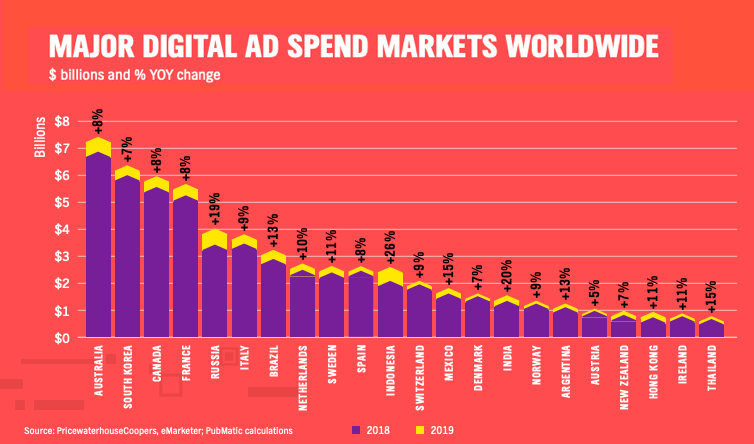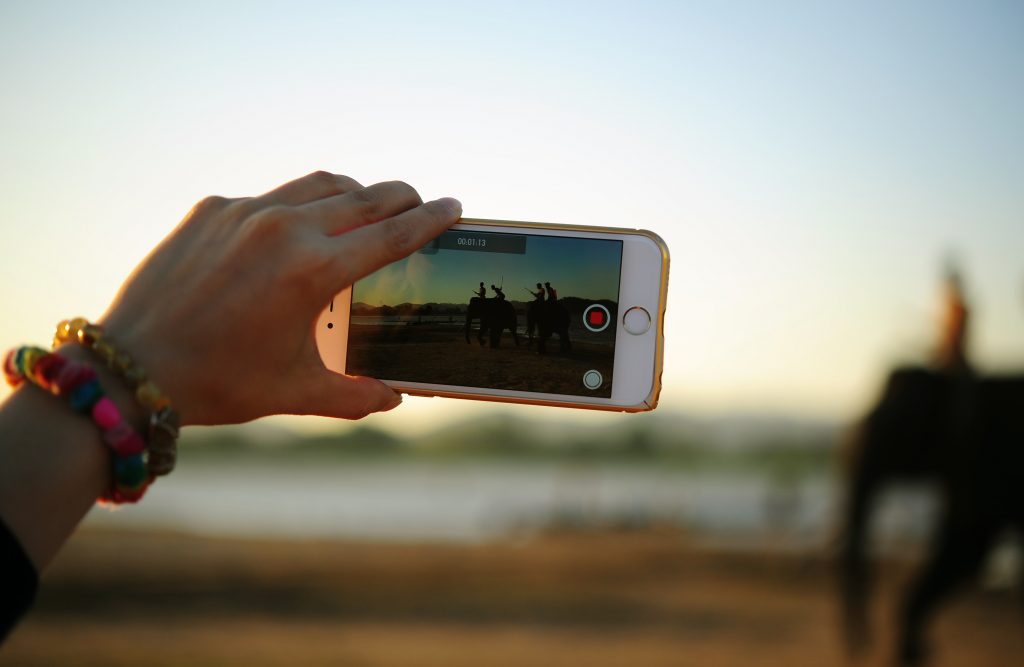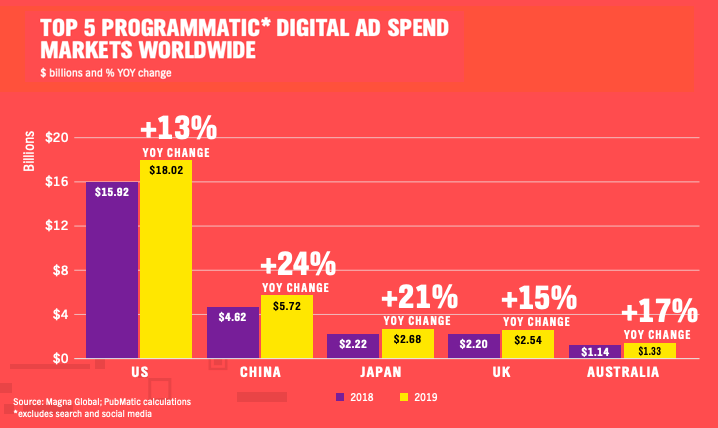Indonesians like to spend a lot of time in front of screens. The country has over 150 million internet users who spend an average of eight hours and 36 minutes online every day, according to We Are Social’s January 2019 report.
The figure is much higher than the global average, which sits at six hours and 42 minutes, showing just how much Indonesians love to connect to the digital world on a daily basis.
For the country’s population, which is currently dominated by people under 30 years old, an average Indonesian spends around three hours and 26 minutes on social media platforms every day, with YouTube, WhatsApp, Facebook, and Instagram as the most active social media platforms in the country, according to We Are Social.
With so much attention captured by social media, digital advertising and marketing spending are gravitating to these channels.
According to the 2019 Global Digital Ad Trends Report From PubMatic, Indonesia is the fastest-growing digital ad market in the world, followed by India. Digital advertising spending is estimated to reach USD 2.6 billion in 2019, an increase of 26% from the previous year.

Part of this expenditure goes into ads, but an increasingly popular marketing tool is so-called influencer marketing, a strategy that involves key opinion leaders (KOLs) or content creators who represent brands and deliver their message through authentic conversations and engagement.
Influencer marketing taps into the human habit of trusting people rather than just reading about a product in a corporate ad.
Word of mouth remains the most credible form of advertising, according to the Global Trust in Advertising Report by Nielsen. While 83% of Nielsen’s respondents trust the recommendations of friends and family, 66% of them said they trust online reviews from strangers who are the actual users of products and services.
Consumers are more likely to trust social influencers they’ve formed a bond with online, rather than television commercials that feature well-known celebrities. Cost efficiency is another reason why many brands now prefer to advertise with influencers as it is comparatively cheaper than using conventional channels like television.
The rise of digital content studios
The demand for influencer marketing gave rise to a new type of business. Digital content studios serve as representatives for creators and influencers in Indonesia. They are sometimes also referred to as multi-channel networks, or MCNs.
“Media may only expose the well-known influencers like Atta Halilintar [Southeast Asia’s first YouTuber who racked up 10 million subscribers]. But actually, Indonesia has so many talents from all over the country. For example, we’ve found many YouTubers from small cities outside Jakarta who already have thousands of followers or subscribers,” Budi Putra, the country manager of one such agency called Collab Indonesia, told KrASIA.
Collab is a talent network and entertainment studio focused on maximizing the creative and financial potential of the video creators and content libraries under its management. It helps creators build an audience, monetize their channels, and connect with brands or ad agencies so they can generate more revenue from their content.
“We provide data analysis, channel management services, as well as consulting so the creators understand the best practices of managing their content and channels, which include editorial planning and a data-based content strategy so they can build up a large audience and expand,” Putra explained.
However, unlike some influencer agencies, Collab doesn’t interfere too much with their clients’ content, so creators still have full freedom in their work. In addition, it also gives creators copyright protection.
Collab Indonesia currently has more than 200 creators in its network. Most of them are independent personalities who got their start on the same video-sharing platform. “Most of our creators are YouTubers with thousands to millions of subscribers,” Putra said.
Putra decided to join Collab Indonesia after serving as the associate vice president of content at Bukalapak, an Indonesian e-commerce marketplace. He was also CEO of The Jakarta Post’s digital units and was the country editor for Yahoo! Indonesia.
Putra said he believes that the future of content lies in digital platforms and that influencers play an important role in growing the content business in Indonesia.
He said that companies like Collab Indonesia use a profit-sharing system with their creators who receive revenue from various channels, including Google AdSense, brand partnerships, and royalties.
“Creators who start to monetize and expand their content will eventually need a team to help manage their channels, but not every creator can afford that. Therefore, digital content studios or MCNs fill this gap and serve as their supporting team. The market is huge in this sector,” Putra said.
According to him, there are only a handful of MCNs in Indonesia including Famous.id and WebTVAsia—with ample opportunity for new players entering the business.

Emphasis on micro-influencers
According to Putra, Collab Indonesia works with non-celebrity creators who have unique content, as they can be nurtured to become micro-influencers.
The term “micro-influencers” describes people who have a decent follower base (usually between 2,000 and 50,000 followers) on a particular social media channel. A micro-influencer has a niche and is well-known for their thoughts and expertise in that field.
Putra said that more brands are eyeing micro-influencers today as they tend to be more engaged with their followers on a daily basis, compared to highly influential people who have millions of followers.
“Brands still work with well-known influencers or public figures to increase awareness of their products. However, if brands aim to increase sales, they will come to micro-influencers. These influencers have a more loyal audience so the conversion rate is high,” said Putra.
Agnes Oryza, an Indonesian beauty blogger and Instagram influencer, has benefited from this trend.
She started her “influencer career” as a blogger in 2009. Oryza now has 29,000 followers on Instagram and more than 2,000 subscribers on her YouTube channel, while her blog has reached four million page views since its inception.
That’s not massive in internet terms. Nonetheless, due to her consistency in creating authentic content, Oryza said she can receive up to ten offers to partner with beauty brands or relevant projects each month. She has also signed a number of exclusive contracts with several big brands including Dove, where a brand locks in exclusive product appearances on her channels and feeds during the contract period.
“Based on feedback from several brands that I have worked with, the engagement rate on my Instagram channel is higher than influencers with hundreds of thousands of followers, so they prefer to work with micro-influencers like me,” Oryza told KrASIA.
Oryza likes to work alone rather than joining an MCN because she appreciates the independence she has in managing her content’s style.

“Maybe digital content studios are more suitable for new influencers and creators but since I’ve been in the field for a while, I prefer to work independently,” she added.
Being an influencer is a promising profession in today’s digital age. According to Oryza, she can earn between IDR 15 million (about USD 1,000) and tens of millions of rupiah per month, which is well over Indonesia’s average monthly wage. No wonder new influencers and content creators are coming online in Indonesia every day, giving influencer platforms like Collab Indonesia the opportunity to grow their business.
Influencers in social commerce
Despite its fast growth, the total digital ad spend in Indonesia is actually still much lower than in the United States or China, where expenditure was over USD 10 billion in 2018 and is projected to to see double-digit growth in 2019, according to PubMatic’s report.

Chinese consumers tend to depend on their social networks for recommendations of products and services, which drove the influencer marketing industry to an estimated value of USD 9 billion.
In these mature markets, collaborating with KOLs has become a crucial element for any brand’s overall marketing strategy. Companies turn to agencies or influencer platforms to help them find suitable talent.
Like other verticals in the digital industry, it looks like Indonesia’s influencer marketing is following in the footsteps of China. For example, Indonesian e-commerce platforms have started to adopt features that allow consumers to shop through live streams and games that are hosted by sellers.
Platforms like Shopee and Lazada also often engage with local influencers to promote products via their streaming services.
Live streaming and shopping have already merged in various forms in China. Giant players like Alibaba-owned Taobao has enriched the e-commerce experience with content offerings which include video, live streaming, and social media features, opening a window of opportunity for brands to leverage popular KOLs.
Earlier this year, Indonesian e-commerce unicorn Tokopedia launched a social e-commerce feature called “Tokopedia by Me,” allowing anyone to recommend their favorite products and generate profits from it. The company said that the feature gives all Tokopedia users the opportunity to become influencers, but those who already have a following might have a head start if they can promote it to their fans.
Social commerce is commonly accepted in Indonesia, considering its culture that is based on personal trust and an affinity for group cohesion and group activities. It won’t be a surprise to see e-commerce players dive deeper into exploring more social commerce and influencer marketing opportunities.
Meanwhile, firms like Collab that can identify and nurture the next wave of online personalities will find an ever-growing number of channels for its talent to utilize, influence, and create in.
